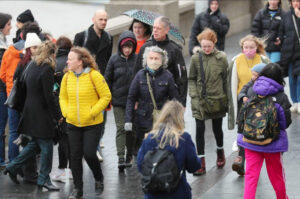Depression, anxiety drive increase in UK people too ill to work

LONDON — Depression and anxiety have been the biggest driver of the increase in Britons who say they are too ill to work, closely followed by a category which includes long-term COVID-19 symptoms, official figures showed.
Britain has been slower to recover from the COVID-19 pandemic than any other major economy apart from Germany, partly because the number of people who are able to work remains below its pre-pandemic level.
Poor health is now the major factor behind this. Compared with before the pandemic, an extra 412,000 people aged 16 to 64 said they are unable to work because of long-term sickness in the three months to the end of May, a 20% rise.
By contrast, the number of working-age people who are economically inactive for other common reasons, such as early retirement or caring responsibilities, is now lower than it was before the pandemic, reversing an earlier rise.
Wednesday’s figures give a breakdown of what lies behind the increase in ill health. Most of the more than 2.5 million working-age people who are long-term sick report multiple health conditions.
Nearly a million report five or more health problems, up 42% from 2019, Britain’s Office for National Statistics (ONS) said.
The commonest category of ill health is ‘depression, bad nerves, anxiety.’ The number of people who are long-term sick with these conditions is up by 386,000 from 2019 at 1.351 million, the ONS said — a 40% increase. ‘Other health conditions’ — a category which includes long COVID — have risen by 260,000 to 754,000, a 53% rise.
Back, neck and limb problems are also widespread and have risen by around a quarter.
The ONS said an ageing population only explained about 40,000 of the more than 400,000 increase in people who are long-term sick. Instead, it highlighted the number of people waiting for treatment from Britain’s National Health Service, which has risen to 7.4 million by May from 4.6 million in January 2020. — Reuters




